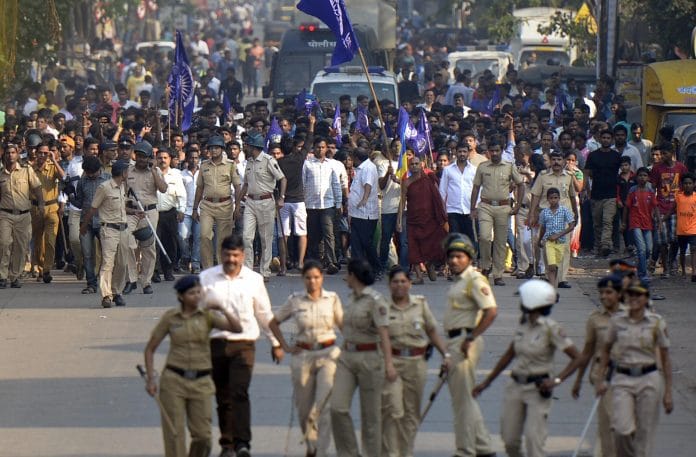The five activists — Surendra Gadling, Mahesh Raut, Sudhir Dhawale, Rona Wilson and Shoma Sen — refused bail and are in judicial custody.
Mumbai: The Supreme Court gave some relief to five activists that the Pune police arrested Tuesday by placing them under house arrest in their own homes, but the other Left-leaning activists the police arrested in June have now spent nearly two months behind bars.
The five arrested in June — Surendra Gadling, Mahesh Raut, Sudhir Dhawale, Rona Wilson and Shoma Sen — are in judicial custody. Even as the accused can apply for bail in judicial remand, Gadling, Raut, Dhawale, Wilson and Sen have chosen not to and a chargesheet is expected to be filed in the case within the next two weeks.
The activists were arrested in connection with the Elgaar Parishad organised at Shaniwar Wada in Pune on 31 December, 2017, that allegedly instigated the violence at Bhima Koregaon.
At least one person was killed and several were injured when stones were hurled and vehicles set ablaze in villages around Koregaon Bhima in Pune district, where Dalits from across the country were making their way for the bicentenary celebrations of the 1818 Bhima Koregaon battle – held on 1 January.
Also read: Bhima-Koregaon arrests, Rafale row, note ban have one common problem: BJP’s execution
A week after the incident, the Pune Police registered an FIR filed by one Pune-based Tushar Damgude. The FIR, which has formed the basis of all 10 arrests so far, speaks about how statements, speeches and songs at the Elgaar Parishad had the potential to create social divide and instigate violence and linked the 1 January Bhima Koregaon attacks to the event.
The case so far
The first arrests were made on 6 June when the Pune police picked up Dalit activist Dhawale, activist Wilson, academician Sen, former Prime Minister rural development fellow Raut and activist-lawyer Gadling from Mumbai, Delhi and Nagpur. Of the five, only Dhawale’s name finds mention in the FIR along with words from an allegedly provocative speech.
Based on material seized from the five accused, the Pune police Tuesday made five more arrests — lawyer Arun Ferreira, labour rights activist Vernon Gonsalves, poet Varavara Rao, human rights lawyer Sudha Bhardwaj and journalist-activist Gautam Navalakha.
All 10 accused have been booked under the stringent Unlawful Activities Prevention Act (UAPA), which is meant to punish terrorism and acts deemed detrimental to India’s sovereignty. Under UAPA, the accused can be remanded to police custody for a maximum of 30 days and a chargesheet has to be filed within 180 days of the arrest.
On 7 June, the prosecution initially sought 14 days of police custody for Gadling, Wilson, Dhawale, Sen and Raut, while a lower court in Pune granted seven days.
The letter
The police sought custody citing several reasons such as the recovery of a number of letters containing codes that need to be deciphered, the need to ascertain exactly what position the five accused hold in the banned Communist Party of India (Maoists) and their alleged participation in meetings of the CPI (Maoists) and an attempt to spread its ideology and implement its decisions.
It also spoke about the recovery of several letters related to the banned organisation and the need to ascertain the authors and its purpose.
The state highlighted one such letter that suggested a plot to assassinate Prime Minister Narendra Modi by targeting his roadshows without naming him directly. The letter, details of which were put forward before the court, and reiterated Wednesday while seeking custody of Ferreira, Rao and Gonsalves, mentions a ‘Rajiv Gandhi-type’ incident. Former prime minister Rajiv Gandhi was assassinated on 21 May, 1991.
Also read: No evidence to link Hindu group leader Bhide to Bhima Koregaon attack, says Maharashtra CM
Besides, the prosecution also mentioned how there was a reference to Gadling having helped the banned CPI (Maoists) with maps of deployment of security forces in Maharashtra and Chhattisgarh. Besides, it argued that the police needs to investigate exactly what kind of information, materials, financing and arms have the accused provided and to whom while working for their organisation.
The court later extended custody for seven more days. The five activists arrested in June have so far spent two weeks in police custody before being remanded to judicial custody, under which they can technically seek bail. The police has, however, reserved its right to seek their custody later.







The word ‘Urban Naxalism’ was coined by the government and indeed, this was a coordinated crackdown against the left-wing activists. Even though these raids and the arrests that followed, were carried out recently, the issue of ‘urban Naxals’ was discussed within the security establishments even before Bhima Koregaon Violence. An intelligence report titled ‘Urban Naxalism: Growing Menace and Remedies’ was also deliberated with senior security officials of Maharashtra.